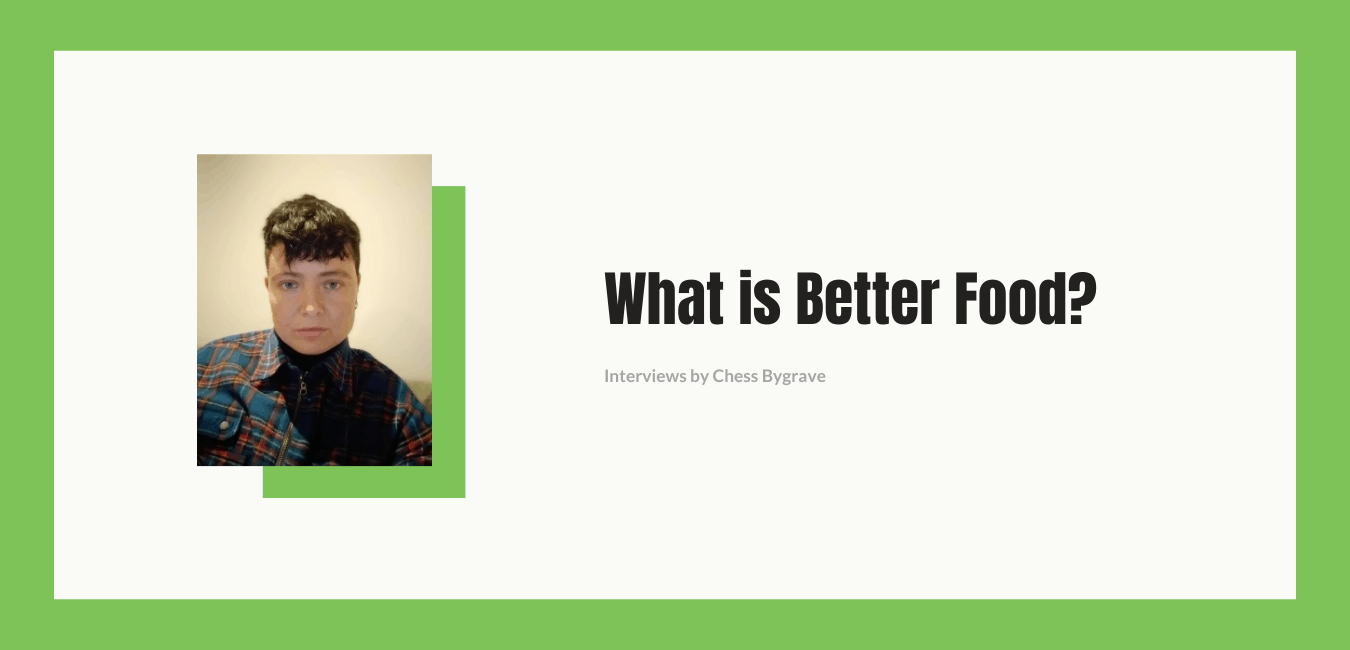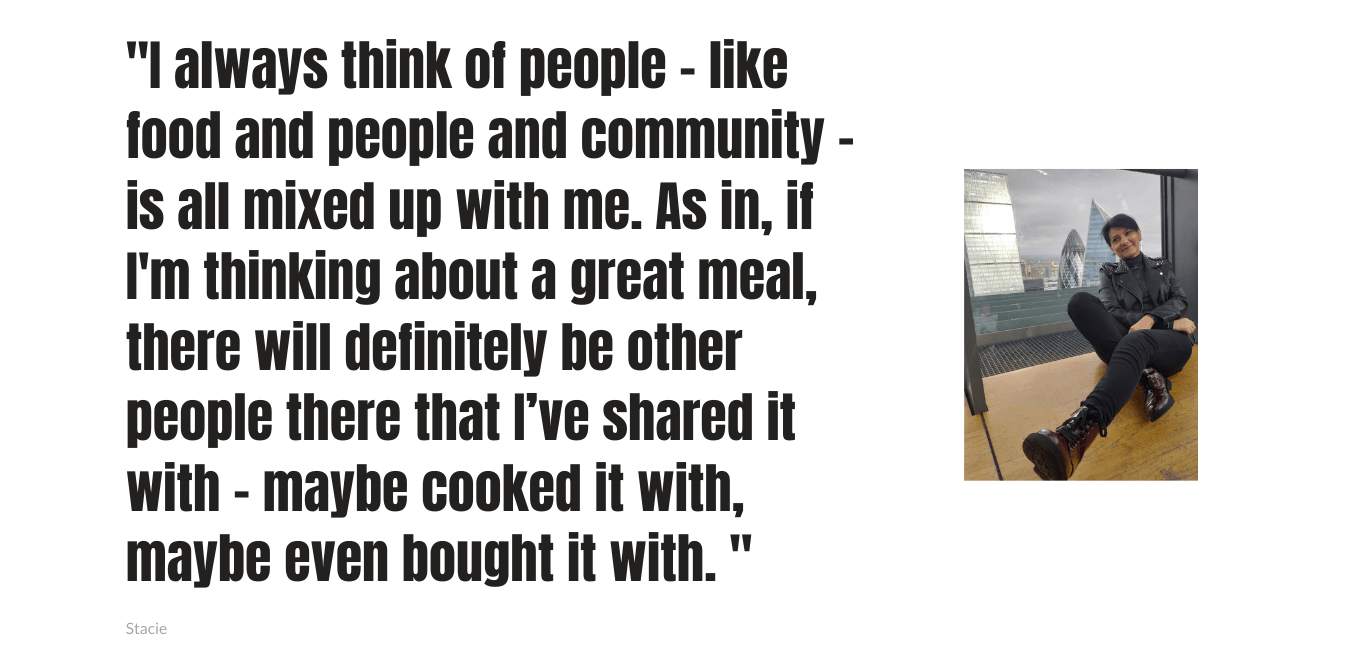When it comes to food, we want to empower people. We want to create an equality in the food system that works for everyone, with the resources, knowledge and capacity to make changes. Food is diverse, and so are we, and improving the system for everyone requires diverse approaches. However, in order to convince those in positions of power to take action, we need to understand the issues people are facing and find solutions that work for everyone.
That’s why we decided to reach out and talk to some of the lesser-heard voices in the better food movement, without expectation. I’m Chess (they/them) and today we speak to Stacie (she/her), who shares her experience of connection with food through Jewish festivals, what food means to her, and the issues she faces with our current food system.
Love or hate marmite?
This is a very interesting question, isn’t it? Because it’s one of those concepts in life where it’s black and white. If you push me, I would probably say I love it. But I’d also say that I don’t love it all the time.
On a spectrum, do you prefer sweet or savoury?
Sweet, definitely.
What did you used to eat as a kid and do you have any memories that come up when you think of food?
What a cool question! Ok, let me think, as that’s a long time ago. I suppose it makes me think of my Mum and the food that I used to have to eat before going to school – especially in the winter. I was made to eat porridge, and because she wanted me to eat porridge, I told her it had to be chocolate porridge!
Do you have any food rituals?
In Judaism, each festival has its own food. So, for example, the next one coming up is Chanukah. It’s all about donuts because they’re associated with the story of the oil lasting for eight days so the Israelites could escape from the Egyptians and actually live. So, we celebrate by cooking things in oil, which is not healthy at all! But during that festival, we don’t think about how unhealthy it is. The main thing is that you eat something that symbolises that story, which we do with every festival.
I suppose I naturally think a lot about Jewish food in relation to my heritage and my family and traditions. I do think of it like that. I guess other people don’t, and if you don’t have that kind of culture or history then you don’t think about food that way. Maybe I think of it differently?

How have your food habits evolved over the years?
I think I was beginning to understand the effect of food on my body – in a very superficial way – when I was at home with my parents. The next big change, and I remember it distinctly, was when I went to university. So, the situation at this point is that I’ve been brought up in a Jewish home where we keep a kosher diet, but then I go to university and I’m sitting on my bed thinking, ‘what am I going to eat?’ Because I was still keen to keep a kosher diet, I had no idea where the hell was I going to get kosher meat from as a student! it’s very expensive. And I just decided that the easiest and best thing for me at that point was to become vegetarian, so that’s when I made my decision.
After I left university and came back into the world, I got more and more involved in organisations like friends of the earth. I changed my career in order to work on issues to do with the environment. From that point on, I was even more committed to being a vegetarian, but the environmental sector made it even more important. On top of that the main thing about food for me now is how it affects your mental and physical health, and that’s really important to me.
Do you think there’s a pressure from society to eat certain foods and buy from certain places?
I think I’m strong minded enough to know that and still make my own decisions. There is a ‘green’ cooperative that sells all organic food near me and if I have time to buy from there, I do. And why do I do that? I don’t do it because I think I should; I do it because it’s a really nice shop, I like supporting independent businesses, and I know it will be good quality food. So, I kind of mix and match that with the big supermarket shop. I try to make informed choices. I always read the labels of everythingI buy, but I’m not fanatical, so if I can’t get to the organic shop, it’s not gonna really bother me. I will make an effort and I’ll try, but if I can’t, I can’t. I’m not gonna cause myself sleepless nights over it.
If I gave you £5 billion to make the UK food system better, what would you do?
I wish money didn’t exist. I mean, if we go back to the whole kibbutz way of socialist life, people who lived on the kibbutz had access to completely local produce. They lived on the farm with organic, fresh food every single day, and nobody paid a penny. It didn’t matter how old you were, what work you used to do, how clever you were or anything. In England, my big thing is equality. We are all equal and we should all be able to eat the food that we know is healthy and nutritious for us. I feel like we need to get underneath the reasons why only a certain group of people can afford local, organic healthy food, and until we do that, we can’t really solve it. It’s too big for me to come up with a solution, I’m afraid.
I think if I had all the time in the world, I’d make a lot more food from scratch. And if everything was ideal, I’d be making all that with friends and we’d all share it. Because that’s the best thing about food – it brings people together and it’s nice if you’ve made something that other people like. That’s the beauty of food.
That’s a beautiful reflection. Now I really want a massive community meal, but sadly we can’t right now.
I know! And now I really want some chocolate!
What does better food mean to you?
I always think of people – like food and people and community – is all mixed up with me. As in, if I’m thinking about a great meal, there will definitely be other people there that I’ve shared it with – maybe cooked it with, maybe even bought it with. The ingredients would be fresh (organic and local if possible), but really tasty, healthy and varied. I think that’s important as well. It has to be yummy. We haven’t even talked about how the whole point of food is that you wanna go, ’Ooo, that’s so delicious, I want more!’ Because you do, don’t you?! That’s the ultimate goal!